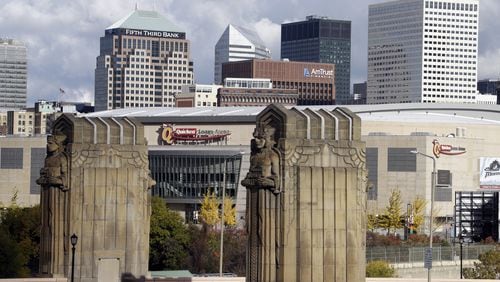CLEVELAND – The movement to deny Donald Trump the Republican nomination for president sighed its last breath shortly after 10 p.m. this evening, as an alliance of GOP stalwarts and Trump supporters outlasted the last remnants of resistance in a 14-hour, marathon session of the convention rules committee.
In a series of three votes, the committee that sets the rules for next week’s four-day convention here eliminated the pestering argument, made primarily among social conservatives hostile to the unorthodox winner of this year’s primaries, that delegates were free to follow their consciences and ignore their pledges to support the candidates who won their states’ primaries and caucuses.
Victory wasn't what anti-Trump forces were shooting for, but they also failed to win the quarter of the votes on the 112-member panel that would have allowed them to carry their battle to the convention floor on Monday.
With 28 votes, anti-Trump forces would have been allowed to generate a minority report that would have placed a “conscience clause” before the full convention.
Even so, throughout the day, the same alliance of Trump supporters and party regulars beat back attempts to strip Reince Priebus, the chairman of the Republican National Committee, of much of his powers, or to issue bonus delegates in future national conventions to state parties with high Republican turnout -- which would gradually increase the clout of solidly GOP enclaves.
One proposal would have rewarded states that close their primaries or caucuses to non-Republicans, a move opposed by Republicans from many Southern states -- including Georgia and South Carolina -- because of the proposal's resemblance to the closed primaries conducted by Democrats in their effort to continue segregation. While somewhat defanged, the federal Voting Rights Act would be an obstacle.
U.S. Sen. Mike Lee of Utah wasn’t convinced. Said the senator:
"One of my favorite movies is 'What About Bob?' There was this great line, saying there are two kinds of people in the world: People who like Neil Diamond, and those who don't. There are two kinds of people who participate in American politics: Republicans, and those who are not."
In essence, those who didn’t want to see next week’s four-day convention become a contested event played rope-a-dope, allowing the opposition, which included many supporters of U.S. Sen. Ted Cruz’ candidacy, to exhaust itself amendment after amendment.
Finally, at 9:20 a.m., pro-Trump forces went on the offensive. Bass-voiced Jordan Ross of Nevada, dressed in his constable’s uniform, introduced the first of two amendments, which read thusly:
"Nothing in this rule shall be construed to prohibit the binding of delegates pursuant to Rule No. 16(a)"
Said Ross:
"I'm a politician. The caucuses in my constituency voted overwhelmingly for Donald Trump. I have no intention of returning to those people I rely on in office by telling them I had a change of heart and am shredding their votes. It's time, after all these years, to put an end to this."
Several others spoke in favor of the proposal. No one spoke in opposition. They had given up. The motion passed 87 to 12, well short of the 28 votes needed to continue the fight.
Then the anti-Trump forces were allowed to take their best shot. Kendal Unruh of Colorado introduced the following amendment to the convention rules:
"Notwithstanding any other provision of these rules or any rule of the U.S. House of Representatives, the right of each delegate and alternate delegate to vote their conscience on all matters shall not be infringed or impaired by any state party rule, state law, ruling by the national convention chair or any other method."
Said Unruh:
"It's a God-given right. It's why we have the Bill of Rights. It is why you cannot force a doctor to perform abortions. You cannot force the Mennonites to go into the draft. It is systemically the core of every single American."
A motion to rush the proposal to a vote was passed – by pro-Trump forces – 77 to 21. The conscience clause then lost on a voice vote.
A final vote, directed at another section of convention rules, reinforced the right of the Republican party to bind delegates to the results of state primaries and caucuses.
Senator Lee spoke against it, noting that delegates usually followed the directions given to them by voters of their home states. He continued:
"At the end of the day, we have to remember that it's important for presidential nominees to win two votes. First to win the primaries, and then to win over the delegates. It almost always happens. I hope that whoever our nominee is going to be this time will in fact win over the delegates. But rules like this are not going to help that.
" This problem, this angst, as we will see in a few days, isn't going to go away just because we paper over it with rules. So I say to Mr. Trump and those allied with him: Make the case to those delegates who want to have a voice. Make the case that they should use their voice to support him."
Pro-Trump forces passed the measure easily with a voice vote. Now, about that vice presidential nominee.
About the Author








